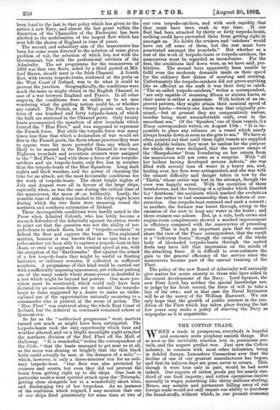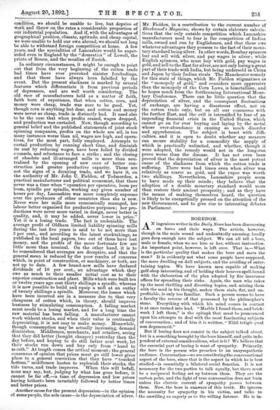THE COTTON TRADE.
v
HEN a trade is prosperous, everybody is hopeful and economic seers prophesy smooth things. But so soon as the inevitable reaction sets in, pessimism pre- vails, and the augurs predict woe. Just now the Cotton industry, in common with most other industries, being in doleful dumps, Lancashire Ca,ssandras aver that the decline of one of our greatest manufactures has begun, and that its halcyon days are gone, never to return. This, though it were true only in part, would be bad news indeed. Our exports of cotton goods pay for nearly one- third of our food imports ; and cotton operatives receive annually in wages something like thirty millions sterling. Hence, any notable and permanent falling away of our foreign trade would not only impair our ability to purchase the bread-stuffs, without which, in our present economic condition, we should be unable to live, but deprive of work and throw on the rates a considerable proportion of our industrial population. And if, with the advantages of geographical position, climate, aptitude, and cheap capital, we were unable to hold our own abroad, we should not long be able to withstand foreign competition at home. A few years, and the specialities of Lancashire would be super- seded even in England by the " domestics " of Lowell, the prints of Rouen, and the muslins of Zurich.
In ordinary circumstances, it might be enough to point out that from the very beginning of the cotton trade bad times have ever provoked sinister forebodings, and that these have always been falsified by the event. But the present slackness is marked by several features which differentiate it from previous periods of depression, and are well worth considering. The old race of manufacturers held as a matter of faith, faith born of experience, that when cotton, corn, and money were cheap, trade was sure to be good. Yet, though corn is anything but dear, and cotton and money were never so cheap, trade is distinctly bad. It used also to be the case that when profits ceased, wages dropped, and production was curtailed. Now, though according to general belief awl the published statements of joint stock spinning companies, profits on the whole are nil, in too many instances worse than nil, wages are high, and opera- tives, for the most part; fully employed. Attempts to curtail production by running short time, and diminish its cost by reducing wages, have been foiled by divided counsels, and reluctance to face a strike ; and the closing of obsolete and ill-arranged mills is more than neu- tralised by the opening of new ones of better con- struction and greater productive capacity. These are not the signs of a decaying trade, and we have it, on the authority of Mr. John C. Fielden, of Todmorden, a practical manufacturer and political economist, that there never was a time when "operative per operative, loom per loom, spindle per spindle, working any given number of hours per day, Lancashire was more completely supreme over the producers of other countries than she is now. Never were her mills more economically managed, her labour better organised for productive purposes; her pro- ductions were never more varied in design, never better in quality, and, it may be added, never lower in price." Yet it is a losing trade. The fact is undeniable. The average profit of Oldham limited liability spinning mills during the last five years is said to be not more than 3 per cent., and according to the latest stocktakings, as published in the local papers, two out of three have lost money, and the profits of the more fortunate few are little more than nominal. On the other hand, it is to be remembered that averages are deceptive, and that the general mean is reduced by the poor results of concerns which, in point of construction, or machinery, or both, are not up to date. A few brand-new mills have declared dividends of 10 per cent., an advantage which they owe as much to their smaller initial cost as to their superior construction and plant. Mills which were built ten or twelve years ago cost thirty shillings a spindle, whereas it is now possible to build and equip a mill at an outlay of twenty shillings a spindle. Moreover, the losses which have been incurred are in a measure due to that very cheapness of cotton which, in theory, should improve business by stimulating consumption. A falling market must needs be a losing market, and for a long time the raw material has been falling. A manufacturer cannot work without stocks, and when their value is continually depreciating, it is not easy to make money. Meanwhile, though consumption may be actually increasing, demand diminishes. Middlemen, merchants, and retailers, seeing that they did better (bought cheaper) yesterday than the day before, and hoping to do still better next week, let their stocks run down and buy only from "hand to mouth." At length comes the critical moment ; the general consensus of opinion that prices must go still lower gives place to a general conviction that they have 'touched bottom," middlemen hasten to replenish their stocks, the tide turns, and trade improves. When this will befall, none may say, but, judging by what has gone before, it cannot be far off,—a time of depression and low prices having hitherto been invariably followed by better times and better prices.
Another cause for the present depression—in the opinion of some people, the sole cause—is the depreciation of silver. Mr. Fielden, in a contribution to the current number of Blackwood's Magazine, shows by certain elaborate calcula- tions that the• only outside competition which Lancashire manufacturers need to fear is the competition of Indian mills, owned and run by Englishmen, and that these owe whatever advantages they possess to the fact of their mone- tary standard being silver. In other word s, Bombay spinners buy and sell with silver, and pay wages in silver ; while English spinners, who must buy with gold, pay wages in gold, and sell to the East for silver, are not only losing a great part of their trade with India, but being undersold in China and Japan by their Indian rivals The Manchester remedy for this state of things, which Mr. Fielden stigmatises as the "monopoly of gold," and considers more oppressive than the monopoly of the Corn Laws, is bimetallism, and, he hopes much from the forthcoming International Mone- tary Conference. There can be little question that the depreciation of silver, and the consequent fluctuations of exchange, are having a disastrous effect, not on the cotton trade only, but on all our commerce with the further East, and the evil is intensified by fear of an impending financial crisis in the United States, which cannot go on for ever buying and laying by the metal whose over-abundance is causing so much disorder and apprehension. The subject is beset with diffi- culties, and it is open to doubt whether any measure can secure stability for a commodity the supply of which is practically unlimited, and whether, though it were adopted, the remedy would not in the long-run prove worse than the disease. It has not even been proved that the depreciation of silver is the most potent cause of the slackness from which the cotton trade is suffering. There were bad times even when silver was relatively as scarce as gold, and the rupee was worth two shillings. Nevertheless, Lancashire people seem to have made up their minds ; they believe that the adoption of a double monetary standard would more than restore their ancient prosperity ; and as they have the means of making themselves heard, the question is likely to be energetically pressed on the attention of the new Government, and to give rise to interesting debates in Parliament.



































 Previous page
Previous page